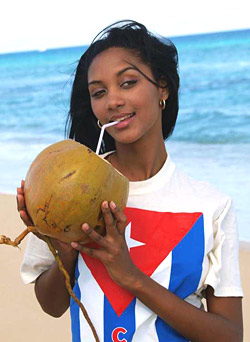
Every tourist should have a valid
passport and Cuban Tourist Card.
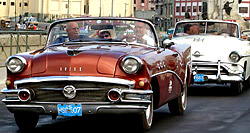
Driving is an excellent way
to explore beauty of Cuba.
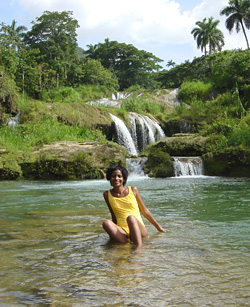
Tourist Card allows its holder to stay
in Cuba for 90 days from the date
of entry, is valid for one entry.
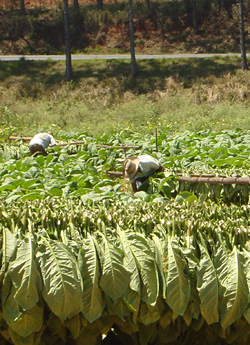
Pinar del Rio is famous for producing
the finest tobacco leafs in Cuba.
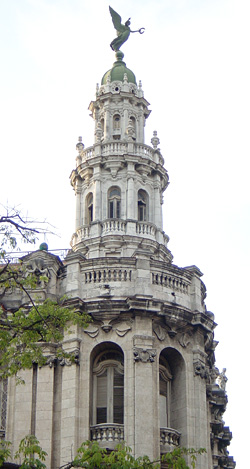
Gran Teatro de La Habana is located
in the Paseo del Prado in Havana.
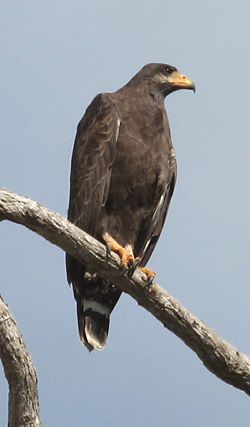
Cabo de San Antonio
situated at the west end of Cuba.
Eco Tourism enthusiasts can enjoy
a wide range of options. Cabo Corrientes
the reserve is perfect for nature and
beach lovers, haven for Bird Watchers. |
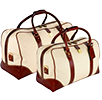
|
Packing for your trip to Cuba
|
What you pack for
your visit to Cuba will depend on the time of year and your
itinerary.
Here are few ideas to help you bring the right
items for your vacation.
|
 Clothing Clothing |
Cuba is a
wonderfully warm, tropical island, so cotton and other light
fabrics are ideal for outdoor activities. Keep in mind,
however, that resorts, restaurants, tour buses and other
public areas are generally air conditioned. During wintertime,
which is slightly cooler, we recommend bringing a light
overcoat. For the rainy season May to October, rain gear or
an umbrella will come in handy.
Casual is the order of the
day in Cuba. However, visitors who enjoy elegant dining,
theatre and other sophisticated entertainment tend to dress
more formally for those occasions.
Loose, light colored cotton clothing, long shorts are acceptable for men and women, although women may find a skirt breezier and more comfortable. Soften your appearance by avoiding logo-splattered, flashy clothing in preference of plainer items.
|
 Electrical
equipment Electrical
equipment |
Cuba’s
electricity is 110 volts, 60Hz, most hotels and resorts
offer 220 volts. Electrical outlets take flat plug prongs.
If
you’re bringing an electrical appliance, check before you
leave to see if you need an adaptor or
converter.
|
 Clock Clock |
You may be hoping
for a vacation where time stands still. Remember that Cuba is on EST - Eastern Standard
Time, from May through October, Cuba transfer into daylight
savings time (one hour ahead). GMT -5 hours, as US - EST in the winter and EDT during the summer.
|
|
|
|
|
Entering Cuba Cuban Tourist Card  |
Every tourist should have a valid passport issued on his or her name and a
Cuban Tourist Card or Cuba Visa. Make sure that your passport in a good condition,
it is important for you to know that
your passport should be valid for at least two weeks after the return date.
Health insurance, with provision for emergency repatriation, is compulsory for visitors to Cuba. Those travellers without adequate health insurance will be obliged to purchase Cuban health insurance on arrival. No vaccinations are officially required. Proof of medical coverage is mandatory for all tourists to enter Cuba.
|
 Sailing to Cuba, be sure to contact port authorities
before you reach jurisdictional waters 12 miles from the base
line. Use these communication channels:
Sailing to Cuba, be sure to contact port authorities
before you reach jurisdictional waters 12 miles from the base
line. Use these communication channels:
- HF
(SSB) channel 2760 (national coastal network) and 2790
(tourism network); or
- VHF channel 68 (national coastal
network) and 16 (tourism network).
|
|
Port
authorities will ask you for the following information:
|
- name of yacht
- flag
- port of registry
- last port of
call
- port of arrival
- estimated time of arrival
(ETA)
- type of craft
- colour of craft
- number of
persons on board.
You must
follow the instructions given by the port authorities and
remain on board until all legal formalities are concluded.
|
 Fly to Cuba on a private plane you must send
an operational request for approval of your flight plan in a
telex addressed to the:
Fly to Cuba on a private plane you must send
an operational request for approval of your flight plan in a
telex addressed to the:
Regimen de Vuelos
de Aeronautica Civil de Cuba, La Habana. Telex: 51727 ACVCU
|
| In the request,
you must specify: |
- whether the
plane is private
- the type of aircraft
- registration
number and class
- starting point
- pilot’s
name
- expected date, place and time of
arrival
- objective of the trip.
|
|
|
Aduana - Clearing Customs |
Visitors
who are well prepared and adhere to a few simple rules should
have smooth trips through customs, both when entering and
leaving Cuba. Key information to
remember:
|
|
Cuban customs
laws prohibits any imports of pornographic material, narcotics
drugs, live animals and firearms, although these last ones can
be authorized by the organization in charge of this tourist
modality when these are for the sport of hunting. Any
possession, consumption and traffic of narcotic drugs and
other substances are penalized, except for those of personal
use accompanied by the corresponding doctor prescription
letter. |
 Inbound
travelers Inbound
travelers |
Duty Free
Travellers to Cuba over 18 years do not need to pay customs duty on 200 cigarettes or 50 cigars or 250g of tobacco; 3 bottles of alcoholic beverages; gifts to the value of US$50; and up to 10kg of medicine.
Seeds, fresh animal or vegetable products, narcotics and psychotropic substances; explosives, firearms and ammunition; pornographic material; publications directed against public order and morality and household electrical appliances are all prohibited. Strict regulations govern the import or export of philatelic collections; precious stones and metals; artistic, historical or cultural artefacts.
In addition to
their personal jewelry, cameras and other valuables, visitors
are allowed to bring into Cuba, duty free, two bottles of
liquor, one carton of cigarettes and up to 10 kilograms of
medicine. Gifts up to a value of $250 US$ can also be brought
in. Of that, $50 is duty-free; the rest is 100 per cent
taxable.
Narcotics and firearms, except for authorized
hunting weapons, are not allowed into the country. No
restrictions exist on the amount of money a visitor can bring
into the country, but amounts over $5,000 US should be
declared. |
|
VCR and
DVD players are now allowed into Cuba:
No restrictions on importation of VCR and DVD
players into Cuba, travelers can bring
them into the country regardless the type, brand or model,
including the built-in ones in other equipments.
Tourists are
allowed to take their personal effects which include the
articles (new or used) that they reasonably need for their
holidays according the length and purpose of the trip, plus:
sport equipment, jewels, photographic camera, camcorder,
cellular phones, blackberries, laptops, Ipods, MP3 players,
video games, hair dryers, electric shavers, binoculars, one
portable radio receiver, tape recorder, one portable music
instrument and a sound recording device.
It's prohibited
to bring into the country: narcotics, explosives, pornography,
any item (including literature) intended to be used against
the national security, animals and plants regulated under the
Convention on International Trade in Endangered Species of
Wild Fauna and Flora, GPS, walkie-talkies, cordless phones
for the household that operate in bands different than 40-49
MHz and 2,4 and 5 GHz and household appliances: freezers, air
conditioners, electric kitchens and furnaces, electric ovens,
electric showers, electric fryers, electric water heaters,
irons travel irons are allowed, toasters and any spare
electrical parts for the above.
For more
information and complete list of the prohibited articles,
please visit website: www.Aduana.co.cu
|
 Outbound
travelers Outbound
travelers |
From May, 2015 Departure Tax is included in your air ticket.
Visitors leaving Cuba can take out 23
cigars (no in box), and 1.14 litres of liquor two regular-sized bottles
of 750ml. To export other items, such as art and antiques,
obtain a permit from the National Registry of Cultural
Objects.
Most legitimate vendors have such permits, and can
officially stamp your receipt.
Strict rules
apply to taking plants and animals out of Cuba. The Convention
on International Trading in Endangered Species (CITES)
prohibits taking the following out of the country: indigenous
flora and fauna; live or preserved specimens and articles made
from parts of endangered species. However, articles made from
species approved by the CITES Administrative Authority in Cuba
may be taken out
|
 |
Getting around Cuba |
 Transportation
Transportation |
|
Cuba has good taxi services as well as car, van and motorcycle
rentals. Tour buses in Havana and Varadero cover the major
sites of interest. For special excursions, contact the tourism
desk at your hotel. Economy travel on buses among major
centres around the country is also available through Busline Viazul. Transport
info
The country has
eleven international airports, and eight local ones with
domestic charters and air taxis. Cuba’s extensive
50,000 km
network of highways and roads, 14,000
kilometers are paved.
Driving is an excellent way to travel around Cuba,
You can pick up your car in all the airports and cities. Car Rental |
 Photography and Filming
Photography and Filming |
Photos and videos
can be taken freely, except in restricted areas, such as
military zones. Museums also have specific
regulations.
|
 Shopping
Shopping |
Shops in hotels,
villas and airports sell Cuban cigars, rum and coffee, as well
as snacks, arts and crafts, toiletries, books and souvenirs.
Specialty stores in the main tourist regions also carry
high-end European and other imports.
|
 Currency
Currency |
Official currency is the Cuban Peso CUP$, divided into 100 centavos, but tourist currency is Convertible Peso CUC$, which replaces the US$ Dollar as currency in tourist related establishments like hotels, restaurants and dollar shops.
US$ Dollars are no longer accepted as payment.
All the goods and
services in Cuba are priced in Cuban Convertible pesos only,
including transportation and the departure tax from Cuba are
priced and payable in CUCs. Cuban Money
|
|
Telecommunications |
Cuba’s telephone
network provides direct communications inside the country and
out with any part of the world.
The international access code for Cuba is 53, outgoing code is 119 followed by the relevant country code.
Cellular phone company Cubacell have roaming agreements with many international cell phone companies, but not the United States.
GSM network covers most main towns, and cell phones are available for rent, or you can activate your open cell phone in Cuba. Public telephones are widely available for domestic and international calls, but international calls are expensive. All the public phones use only the Pre-paid phone card, no coins. Internet cafes are located in the cities Etecsa Telephone Centers and in the hotels.
Direct dialing codes within
Cuba:
Ancon
419
Baconao 223
Baracoa 21
Caibarien
42
Camaguey (city) 322
Cayo Coco 33
Cayo
Largo del Sur 45
Ciego de Avila
(city) 33
Cienfuegos (city)
432
Florida 32
Granma
(entire province) 23
Havana
7
Holguin (entire province)
24
Las Tunas (city)
31
Matanzas (city)
52
|
Moron
335
Pinar del Rio (city) 82
Playa Covarrubias 31
Playa Giron & Playa Larga 59
Remedios 42
Sancti Spíritus
41
Santa Clara (city) 422
Santa Lucia beach 32
Santiago de Cuba (city) 226
Santiago de Cuba (province) 22
Topes de Collantes 42
Trinidad 419
Varadero
45
Vinales Valley 8
|
Internet and Wi Fi connection
Most hotels nad resorts in Cuba now offer internet access, computer rooms are located in the lobby area. You need to purchase Internet Nauta Card for CUC$ 1 valid for 60 minutes.
On these cards are usario - user ID and contresena - password that you need to sign-in.
When you connect to the access point your browser should open and prompt you for the username and password on the card, and give you a usage monitor.
 Nauta Internet card CUC$ 1 for 60 min Nauta Internet card CUC$ 1 for 60 min
You can access the Nauta homepage using the Internet web browsers in your device, the Nauta authentication page opens up automatically when you start the browser. Make sure you allowed pop-ups and cookies in the browser.
Make sure to buy the right type of card, there's one type to be used on computers provided by the hotel.
Don't forget to sign-out after your session (by tipping 1.1.1.1 in address space), you can use the remaining minutes later.
Places with WiFi in Cuba
are located in central parks and city centers.
List of the WiFi spots in Havana and province:
Havana city:
• La Rampa WiFi covers area from the Malecon up to cine Yara in Vedado
• Parque de 51 in La Lisa
• Parque Coyula in Playa Miramar
• Parque Fe del Valle in Havana centre - Galeano / San Rafael
• El Anfiteatro de Marianao y el Paseo de la Villa Panamericana
• Parque Monaco Pabellones Central and 14 at Expocuba - Lenin park
Pinar del Rio: Independencia and Roberto Amaran parks in city Pinar del Rio & Parque Antonio Maceo in Consolacion del Sur
Artemisa: boulevard - the pedestrian street & parque de La Iglesia & parque San Antonio in Artemisa town
Mayabeque: central park in Guines & the boulevard in San Jose de las Lajas & Madruga Central park.
Matanzas:
Varadero in shoping complex 'Todo en Uno' & La Libertad as well in all the hotels lobby,
Matanzas city in Penas Altas city park,
Cardenas in Jose Antonio Echeverria park.
Villa Clara: Santa Clara in: Leoncio Vidal park city centre & Sandino park & Los Framboyanes square.
Remedios in central park
Cienfuegos: city centre Marti park and Villuendas & el Rapido in Punta Gorda sector near the bay
Sancti Spiritus: Trinidad in Cespedes park - Carillo
Sancti Spiritus in Serafin Sanchez park and Plaza Cultural Yayabo
Ciego de Avila: city Ciego de Avila in Parque Marti and Parque Maximo Gomez in and Moron in central park.
Camaguey: Agramonte & Plaza del Gallo & Plaza de los Trabajadores city parks
Las Tunas: in Plaza Martiana & Parque Antonio Maceo & Tanque de Buena Vista
Holguin: city parks: Calixto Garcia and Julio Grave de Peralta & in Parque infantil Ruben Bravo
Granma: Bayamo in pedestrian street- bulevar and Manzanillo in pedestrian street and Guisa in Calixto Garcia park.
Santiago de Cuba: in four city parks : Alameda, Cespedes, Ferreiro and Plaza de Marte.
Guantanamo: Guantanamo in avenida Camilo Cienfuegos & Baracoa in Marti park & in central park.
Isla de la Juventud: Nueva Gerona in boulevard - the pedestrian street.
|
|
Best months to visit
Cuba |
Taking into
account the Tropical Climate of Cuba, we suggest you to travel
in your winter season. From November to the beginning of
May.
Cuba’s climate is moderately subtropical and
predominantly warm. The island’s average temperature is 25.5 ºC
and average relative humidity is 78 % . It also sees an
average of 330 days of sunshine a year. Cuba’s two clearly
defined seasons are the rainy season May to October and the
dry season November to April.
Weather
average
|
|
Jan |
Feb |
Mar |
Apr |
May |
Jun |
Jul |
Aug |
Sep |
Oct |
Nov
|
Dec |
| Air
temperature ºC |
23 |
21 |
23 |
24 |
26 |
27 |
28 |
28 |
27 |
26 |
24 |
23 |
| Water
temperature ºC |
21 |
21 |
22 |
23 |
24 |
25 |
27 |
27 |
28 |
27 |
26 |
24 |
| Hours of
sunlight |
10 |
10 |
11 |
11 |
12 |
12.5 |
12 |
12 |
11 |
10 |
10 |
9 |
| Rainfall
(mm) |
40 |
36 |
40 |
72 |
177 |
216 |
139 |
158 |
174 |
180 |
79 |
41 |
| Rainy
days |
3 |
4 |
3 |
4 |
8 |
11 |
9 |
10 |
10 |
10 |
5 |
3 |
| Humidity % |
79 |
77 |
76 |
74 |
78 |
81 |
79 |
80 |
82 |
83 |
81 |
80 |
|
|
Health |
Travelling to
Cuba are under no health restrictions, no special vaccinations or immunizations are necessary for traveling to Cuba. It's a healthy country that extends free initial doctor visits and emergency care to travelers.
Drink bottled water and avoid fresh vegetables possibly rinsed in tap water.
Health care and insurance:
We recommend
carrying insurance on your trip from your local insurance
company. In Cuba, insurance can be obtained from Asistur S.A.,
the country’s official travel insurance company.
All
hotels have doctors on staff or on call who guarantee primary
care. Every major resort area also has an international
medical clinic that handles more complex medical conditions.
These clinics are scattered across the country:
Pinar del
Rio, Varadero, Cienfuegos, Trinidad, Cayo Coco, Santa Lucia,
Guardalavaca and Santiago de Cuba.
|
 |
Married in Cuba |
Nothing is more
romantic than a wedding on a tropical island.
Cuba has it
all weddings: splashy weddings; exotic weddings; quiet
weddings; combined weddings and honeymoons. Your travel agent and Cuban wedding planners
can help you design a perfect day. Here are a few pointers to
help you get started.
1- If you have never been married
before, all you need is a passport that is valid throughout
your stay in Cuba, and a tourist card (available from a travel
agent, airline or the Cuban consulate).
2- If either the bride or groom has
been married before, the previously married person must, in
addition to the valid passport and tourist card, also produce
the following documents:
if divorced: his/her birth certificate and
Certificate of Divorce;
if widowed: his/her birth
certificate, Certificate of Marriage and Certificate of
Spouse’s Death.
Have your birth certificate and any
divorce/marriage/death documents translated into Spanish and
certified by a notary public and legalized by the Cuban consul
in your country (service fee
applies).
3- In addition, you must:
Create a sheet that lists your names, home
address, occupations, level of education, nationality and the
full names of your parents, living or deceased.
Attach the
photo page of your passport to this sheet.
Fax copies of
all documentation (including the extras described above if you
have been married before) in both English and Spanish to your
hotel in Cuba at least three weeks before your arrival
there.
Bring all your original documents with
you.
Your marriage will be formalized in the name
stated on your passport. Your passport must therefore be
correct, and the name on your passport must match that on all
your other documents.
After your wedding, your Marriage Certificate
will be prepared as quickly as possible and either given to
you before you leave (time permitting) or couriered at the
hotel’s expense to the home address on your documents. Your
marriage is legalized by your Embassy in Havana and the Cuban
Foreign Affairs department.
For more information, contact the Cuban Consulate in your country (see Passport)
|
 |
Tourist Card Cuban Tourist Card |
The Cuban Tourist Card
allows its holder to stay in Cuba for 30 days from the
date of entry into the Country, and is valid for one entry
into Cuba. For a stay of more than 30 days and only up to
90 days maximum. You require visiting Cuban immigrations
office to extend your visit period, or you
can request at any tourism office in Cuba.
Children
regardless of their age, also require Tourist Card, even if
they are registered on their parents
passports.
Cuban Tourist Card is usually supply along with the airline ticket. Cuban Tourist Cards is generally provided by tour operators or airlines with your ticket, or can be obtained from a Cuban government office. Check if you’re Cuban Tourist Card has a stamp at the back, from tour operators or airlines. Note, the Tourist Card is not valid without stamp.
If you don’t have Cuban Tourist Card you can always purchase it at the airport in Cuba, from the emigration for $20.
|
 |
Passport |
Passport
requirements:
Every tourist should have a valid
passport issued on his or her name and Cuban Tourist Card
or Cuba Entry Visa.
Make sure that your passport in a good condition, it is important for you to know that your passport should be valid for at least two weeks
after the return date.
If you are
planning to work, do business or study in
Cuba you need another type of visa. Contact
Consulate General of Cuba in your country.
|
 |
Forms of payment |
All the goods and
services in Cuba are priced in $CUC Cuban Convertible Pesos,
including transportation and the departure tax from Cuba.
New Regulation
Cuban Peso - 'Moneda Nacional' is Cuban national currency.
Recently you can use Cuban Peso as a form of payment in all stores and services around Cuba.
At the Airport now you can use only the Cuban Peso and Canadian Dollar, US Dollar and Euro.
The $CUC Convertible Pesos I not longer acceptable at Airport stores and bars.
Cubans Pesos exchange CP 24 = 1 $CUC Convertible Pesos.
The value of the Cuban Convertible Peso CUC$ Cuban Money info
To exchange US$ dollars cash into the CUC$ there you pay extra 3%
surcharge.
Exchanges from Canadian Dollars, Euros, UK
Pounds and Swiss Francs will not incur a surcharge.
Travelers
cheques accepted in Cuba: Visa and Thomas Cook.
Credit Cards accepted in Cuba: Visa and MasterCard.

Loss of Credit Card should be reported tel: Havana 7- 55-444
or at regional subsidiaries of the Banco Financiero International.
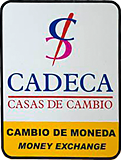 |
CADECA - the government-run currency exchange, has locations throughout Cuban cities for converting foreign money to $CUC.
Hotels and other tourist haunts will also change money, but they give e worse exchange rates. Cubans Pesos exchange CP 24 = 1 $CUC Convertible Pesos.
The exchange rates are based on Cuban Convertible Peso CUC$ 1.00 to US$ 1.00
You will need to show your passport to exchage money in bank.
The best exchange rate you will get in CADECA - Casas de Cambio.
$ € £ Currency converter |
Foreign Currency Accepted by Cuban Banks - Exchage Rates to $CUC Convertible Peso.
 Canadian Dollar CAD $ 1 = CUC$ 0.70 Canadian Dollar CAD $ 1 = CUC$ 0.70
 US Dollar cash US $ 1 = CUC$ 0.95 US Dollar cash US $ 1 = CUC$ 0.95
 Mexican Peso MXP 1 = CUC$ 0.05 Mexican Peso MXP 1 = CUC$ 0.05
 Euro EUR € 1 = CUC$ 1.05 Euro EUR € 1 = CUC$ 1.05
 British Pound GBP £ 1 = CUC$ 1.20 British Pound GBP £ 1 = CUC$ 1.20
 Swiss Franc CHF 1 = CUC$ 1.20 Swiss Franc CHF 1 = CUC$ 1.20
 Danish Krone DKK 1 = CUC$ 0.12 Danish Krone DKK 1 = CUC$ 0.12
 Norway Krone NOK 1 = CUC$ 0.12 Norway Krone NOK 1 = CUC$ 0.12
 Sweden Krona SEK 1 = CUC$ 0.11 Sweden Krona SEK 1 = CUC$ 0.11
 Japanese Yen JPY 1 = CUC$ 0.008 Japanese Yen JPY 1 = CUC$ 0.008
|
|
|











 Nauta Internet card CUC$ 1 for 60 min
Nauta Internet card CUC$ 1 for 60 min


